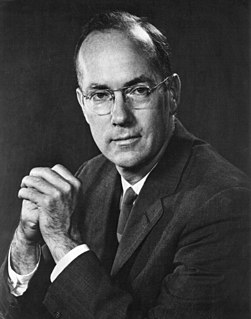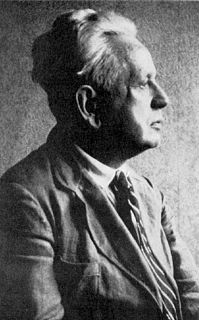A Quote by Nicholas of Cusa
In every science certain things must be accepted as first principles if the subject matter is to be understood; and these first postulates rest upon faith.
Related Quotes
Reasoning is compared to understanding as movement is to rest, or acquisition to possession.... Since movement always proceeds from something immovable, and ends in something at rest, hence it is that human reasoning, in the order of inquiry and discovery, proceeds from certain things absolutely understood--namely, the first principles; and, again, in the order of judgment, returns by analysis to first principles, in the light of which it examines what it has found. Now it is clear that rest and movement are not to be referred to different powers, but to one and the same.
Doubts are the messengers of the Living One to the honest. They are the first knock at our door of things that are not yet, but have to be, understood. . . . Doubts must precede every deeper assurance; for uncertainties are what we first see when we look into a region hitherto unknown, unexplored, unannexed.
Of the first philosophers, then, most thought the principles which were of the nature of matter were the only principles of all things. That of which all things that are consist, the first from which they come to be, the last into which they are resolved....this they say is the element and this is the principle of things.... yet they do not all agree as to the number and the nature of these principle is water.
I am a successful lecturer in physics for popular audiences. The real entertainment gimmick is the excitement, drama and mystery of the subject matter. People love to learn something, they are 'entertained' enormously by being allowed to understand a little bit of something they never understood before. One must have faith in the subject and in people's interest in it.
There is a conceptual depth as well as a purely visual depth. The first is discovered by science; the second is revealed in art. The first aids us in understanding the reasons of things; the second in seeing their forms. In science we try to trace phenomena back to their first causes, and to general laws and principles. In art we are absorbed in their immediate appearance, and we enjoy this appearance to the fullest extent in all its richness and variety. Here we are not concerned with the uniformity of laws but with the multiformity and diversity of intuitions.
Science sometimes improves hypotheses and sometimes disproves them. But proof would be another matter and perhaps never occurs except in the realms of totally abstract tautology. We can sometimes say that if such and such abstract suppositions or postulates are given, then such and such abstract suppositions or postulates are given, then such and such must follow absolutely. But the truth about what can be perceived or arrived at by induction from perception is something else again.
Although a science fair can seem like a big "pain" it can help you understand important scientific principles, such as Newton's First Law of Inertia, which states: "A body at rest will remain at rest until 8:45 p.m. the night before the science fair project is due, at which point the body will come rushing to the body's parents, who are already in their pajamas, and shout, 'I JUST REMEMBERED THE SCIENCE FAIR IS TOMORROW AND WE GOTTA GO TO THE STORE RIGHT NOW!'"
































